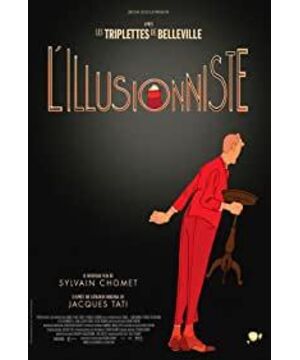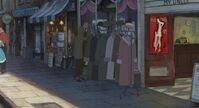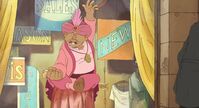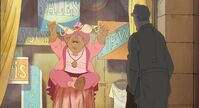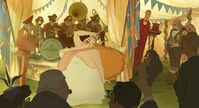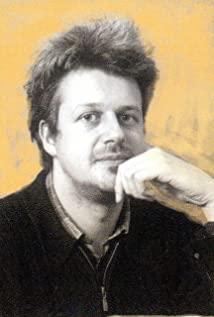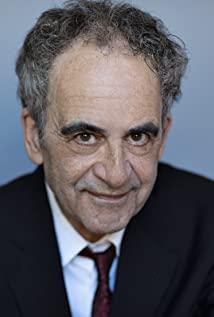A down-and-out magician meets a little country girl, and she follows him to the big city. He conjured her up, made beautiful clothes and fashionable shoes, but he had to go to the garage at night to work, and he also stood in the shopping mall window and made women's underwear to attract customers. Until the little girl's wishes are fulfilled one by one, she becomes more and more beautiful, and she also meets the man she loves. At this time, the magician quietly left a note, went up the mountain to release the little white rabbit, and set foot on the train alone. , sitting opposite strangers, heading for a future so vague that it could hardly be called a future. He held a picture of Zhang Fahuang in his hand. It was a young girl with the same surname as him, his daughter.
Halfway through the film, I was very nervous for a while, for fear that the little girl's ignorant and fearless extravagance would turn into an unbearable burden for the magician, and eventually lead to an unbearable social tragedy. Fortunately, the director is not so promiscuous or so bloody. He quietly makes the girl fall in love, giving the magician a chance to get out, and allowing the beautiful hope to continue quietly on the girl. As for the magician, his whereabouts are as vague as his origins, a kind old man who makes people feel distressed, continues his lonely wandering. If the life of a little girl is like a rose-colored illusion created by magic, then the magician is the practitioner who bears the truth and walks step by step in the most essential loneliness of life.
The film was shot by French animator Sylvain Chome based on a script created by French comedian/director Jacques Tati in 1956 but never put into production. Both Sylvain Chome and Jacques Tati are far from household names in China, although the former was nominated for two Oscars in 2003 for the cartoon "Crazy Dating Beautiful City", while the latter was named "The World's Greatest Movie" by the American "Entertainment Weekly" Director" ranked 46th on the list. The Magician is a semi-autobiographical work by Jacques Tati, carrying his reflections on his relationship with his daughter. The script manuscript was handed over to Sylvain Chome in 2000 by Jacques Tati's daughter Sophie. Sadly, Sophie passed away two years later, without ever seeing the film's completion. What is quite dramatic is that Jacques Tati's illegitimate daughter Helga Marie-Jeanne Schiel jumped out at this time and said that this movie was actually dedicated to her by her father, in order to make up for his guilt of abandoning his daughter, and also to prove their father. A credential for a female relationship. Although many people, including the film's investment company, finally accepted this statement, director Sylvain Chome still believes that Tati is dedicating the film to his daughter Sophie, because he has been busy with the film career and neglected to take care of Sophie's growth. .
In fact, no matter how the housework lawsuit is handled, it is certain that Jacques Tati created "The Magician" from the standpoint of a father. And the sense of guilt he has towards his daughter (perhaps a specific daughter, or a symbol of kinship in general) is expressed in the film through an accidental "father-daughter-like" built on illusions. relationship". A magician who has experienced ups and downs in his life meets an ignorant little girl and passively becomes the person the little girl relies on most. He uses magic to maintain the little girl's fantasy about her father and the world, doing everything she can to realize her wishes and take care of her growth. But finally, there is still a day when the rosy soap bubble will be burst by the person who blows the bubble, telling the little girl that there is no magician in the world, and no father can always be by your side. The magician set foot on the road where he continued to wander. He looked very calm, because how could he not understand that since his loneliness and sadness belonged to the most essential categories of life, what could he do with them?
Director Sylvain Chome, who took over the script from Jacques Tati's daughter, lived up to the family. He grasped and conveyed the surging complicated feelings under the waves of life. There is no great sadness or joy throughout the movie, and there is no intense emotional expression. Some of it is just a kind of sadness that seems to be the attribute of life and spreads like water, until finally "walking to the end of the water", the magician and us are also sour. With a sour smile, he said, "Sit and watch the clouds rise".
2011-2-24
Värmö Sweden
View more about The Illusionist reviews


